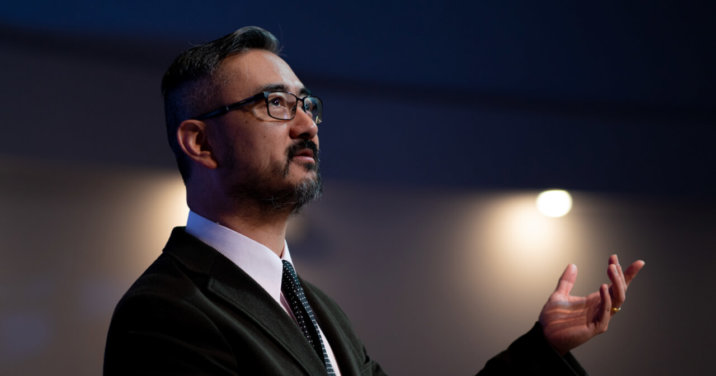Below is an excerpt from Finding Our Voice by Matthew D. Kim and Daniel L. Wong that addresses the forms of discrimination Asian Americans commonly face and how to begin to address that pain pastorally.
***
“What are you?” “Where are you from?” “Where are you really from?” Questions like these bombard Asian North Americans (ANAs) in their everyday life. Due to our appearance, we are presumed to have originated from an Asian country, have a particular Asian background, and speak an assumed “foreign” language. My most vivid memory of this kind of encounter stems from when I was outside my home in Markham, a suburb north of Toronto, stretching with my young children before we went for a jog in the neighborhood. A car filled with young people rolled down their windows and yelled like a chorus, “Welcome to Canada!” I instinctively started running after the car. I didn’t want to pick a fight, but I did want to explain to them that my relatives have been in North America since the late 1800s. I am the same as them except I am a visible minority and I look like the many immigrants from Hong Kong and China who populate our area.
Such experiences affect my perception of self, how I interact with others, how I serve as a Christian, and even how I preach. The Asian North American (Asian North American [ANA] and Asian American Pacific Islander [AAPI] are synonymous, umbrella terms) experience is unique and different from both the white experience and the immigrant Asian experience. In particular, the history and journey of ANA listeners is marked by two competing narratives: that of the model minority and the perpetual foreigner. Due to the ongoing perpetuation of these narratives in North America, concrete reflection on these issues will result in making us more attentive and effective ANA preachers as we care for our ANA hearers who often struggle to make sense of who they are and how their identities impact their Christian life.
Professor Sang Hyun Lee argued that first-generation immigrants’ primary existential question is, “Why am I here?” … First-generation ministry needs to offer theological resources that would help people to engage with this primary question. If so, I think second- and third-generation Asian Americans wrestle with the question, “Who am I?” I think Asian American preaching needs to address both of these questions from different theological angles, addressing both identity and calling (answering “why are we here?”) in a meaningful way.
—Peter T. Cha, professor of church, culture, and society, Trinity Evangelical Divinity School
A biblical understanding of identity
The apostles Peter and Paul serve as helpful illustrations of Christian identity formation. Peter was thoroughly Jewish and needed a “conversion” just as much as a Christian from a gentile background.5 We see Peter’s struggle in Acts 10 in his openness to changing his perspective. I recall a Bible college professor saying that God was already moving Peter to openness as he stayed at the home of Simon the tanner (Acts 9:43). God prepared both Peter and Cornelius for a mutual encounter with the gospel.

The apostle Paul, while also Jewish, is an example of a bicultural, bilingual Christian. He was born in Tarsus, a largely Greek-speaking gentile city, so he was considered a Hellenistic Jewish person. He was embedded in his Jewish religion, leading him to become a rabbi. He was zealous in his misguided commitment to God, hotly pursuing and persecuting Christians. God stopped him dead in his tracks and affected his conversion (Acts 9, 22, and 27). Paul later came to understand who he was by the grace of God (1 Cor 15:10), and he could accept others based on Christ’s acceptance of himself (Rom 15:7) because of his conversion experience. He did not forget his ethnic and religious upbringing. He could operate among many worlds by wisely working with others of various backgrounds.
A biblical understanding of identity facilitates the acceptance of self in all aspects of life. It provides hope and potential for every person found in Christ. In retrospect, I can see how God used my background to shape me into the person I am today. God used various experiences I had in Asian churches so that I could mentor and encourage others who serve in similar circumstances. Like many of us, there are certainly times when I question my identity and thus self-esteem, but I hasten back to Christ and find identity in him under his lordship.
Addressing issues of identity and discrimination
ANAs internalize experiences of racism and discrimination because we are often lumped together with immigrants. We want to be viewed as American or Canadian without an asterisk. We want members of the dominant culture to assume that we’re North American and not a recent immigrant based on what we look like on the outside. As a result of this feeling of otherness, ANAs can live with a chip on our shoulder. We don’t fit neatly anywhere in society—not with immigrants and not with whites. We should be willing to confront stereotypes such as the model minority and the perpetual foreigner. When done with a loving spirit, these miscues can become a touchstone of conversation with those within and outside of ANA communities. They become catalysts for us to become missional, spreading our faith through our own cultural lenses.
Minho Song asserts, “The formation of a healthy ethnic identity is one of the greatest tasks facing [second-generation] Koreans today.” We can add other AAPIs to his assertion as well. This issue of ANA identity cannot be ignored. As marginalized people, our sense of our own in-betweenness often negatively affects how we live as Christians. For this reason, sermons in an ANA context cannot remain generic and culture free. We must speak to the heart of the ANA experience.
One of the leading ANA voices on this subject is Soong-Chan Rah. In his book Prophetic Lament, he challenges us to not merely lament, but actively challenge injustice: “A passive lament that fails to confront injustice fails to consider the power of prophetic advocacy in lament.” To love our neighbor means to speak up for the voiceless and those who need our defense. To love our neighbor means sacrificing our rights and freedom to care for the other person. To love our neighbor means not protecting our comfort, but seeking out opportunities to promote reconciliation, harmony, and peace.
***
Want to learn more? Pick up Finding Our Voice: A Vision for Asian North American Preaching and other works by AAPI authors on Logos.






